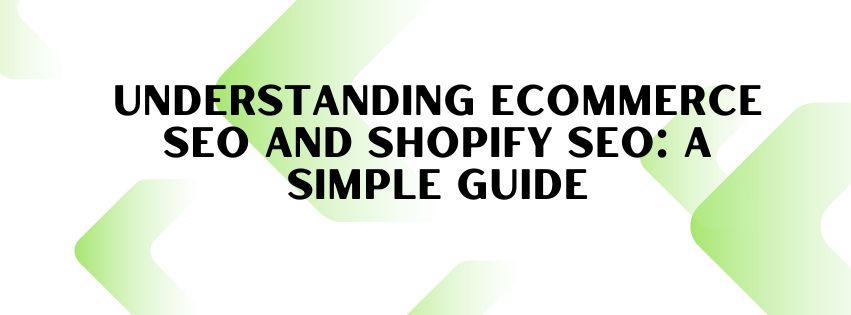
Understanding eCommerce SEO and Shopify SEO A Simple Guide
When it comes to running a successful online store, Search Engine Optimisation (SEO) is crucial. SEO helps your website rank higher on search engines like Google, making it easier for potential customers to find your products. In this simple guide, we’ll explore the differences and similarities between eCommerce SEO and Shopify SEO, and how you can make the most of them to boost your online presence.
What is eCommerce SEO?
eCommerce SEO is the process of optimising your online store to improve its visibility on search engines. This involves various strategies and techniques, such as:
-
Keyword Research:
Identifying the terms potential customers use to search for products like yours.
-
On-Page SEO:
Optimising individual pages on your website, including product descriptions, meta tags, and headings.
-
Technical SEO:
Ensuring your website is fast, mobile-friendly, and free of technical issues that could harm your search rankings.
-
Content Creation:
Producing high-quality, relevant content that attracts and engages your target audience.
-
Link Building:
Acquiring backlinks from reputable websites to improve your site’s authority and ranking.
What is Shopify SEO?
Shopify SEO is similar to eCommerce SEO but focuses specifically on the Shopify platform. Shopify is a popular eCommerce solution that provides an easy-to-use interface for setting up and managing an online store. However, despite its user-friendly design, achieving good SEO on Shopify requires some specific considerations:
-
Built-in SEO Features:
Shopify offers built-in SEO features like customisable title tags, meta descriptions, and URL handles, which can be easily edited from the admin dashboard.
-
App Integrations:
Shopify’s app store offers numerous SEO apps that can help with keyword optimisation, image alt text, and other SEO elements.
-
Site Speed:
Shopify sites generally load quickly, but it’s essential to optimise images and apps to maintain fast loading times.
-
Mobile Optimisation:
Shopify themes are mobile-responsive, but always check your site on mobile devices to ensure a seamless user experience.
-
Blogging:
Shopify includes a blogging platform that allows you to create content to drive traffic and improve SEO.
Key Differences Between eCommerce SEO and Shopify SEO
While the fundamental principles of SEO remain the same, there are some key differences between eCommerce SEO and Shopify SEO:
-
Flexibility:
eCommerce SEO can be applied to any platform or custom-built website, giving you more flexibility in terms of design and functionality. In contrast, Shopify SEO is confined to the Shopify platform.
-
Customisation:
Custom eCommerce websites may offer more extensive customisation options compared to Shopify’s themes and apps, which can affect SEO strategies.
-
Cost:
Building a custom eCommerce site with comprehensive SEO capabilities might be more expensive than using Shopify, which includes many SEO features out of the box.
Tips for Effective eCommerce and Shopify SEO
Whether you’re using Shopify or another eCommerce platform, here are some practical tips to enhance your SEO:
-
Conduct Thorough Keyword Research:
Use tools like Google Keyword Planner or Ahrefs to find relevant keywords for your products.
-
Optimise Product Pages:
Ensure your product titles, descriptions, and images are optimised with relevant keywords.
-
Improve Site Speed:
Compress images, use a content delivery network (CDN), and minimise the use of heavy scripts to keep your site fast.
-
Create Valuable Content:
Regularly publish blog posts, guides, and other content that addresses your customers’ needs and interests.
-
Build Quality Backlinks:
Reach out to industry blogs, influencers, and online publications to gain backlinks to your site.
Conclusion
Mastering both eCommerce SEO and Shopify SEO is crucial for the success of your online store. While the fundamental principles of SEO apply to both, understanding the unique features and limitations of the platform you’re using can significantly enhance your efforts. Whether you’re optimising a custom-built eCommerce site or leveraging Shopify’s built-in tools, focusing on keyword research, on-page SEO, site speed, content creation, and link building will help you attract more traffic and convert visitors into customers. For those looking to maximise their SEO efforts, partnering with an organic SEO agency can provide the expertise and resources needed to achieve the best results.
FAQs:
Q1: What is the main difference between eCommerce SEO and Shopify SEO?
A1: The main difference lies in the platform. eCommerce SEO can be applied to any online store, regardless of the platform, while Shopify SEO is specific to the Shopify platform. Shopify SEO takes advantage of Shopify’s built-in tools and apps, whereas eCommerce SEO may require more custom solutions depending on the platform used.
Q2: Can I use Shopify SEO techniques on other eCommerce platforms?
A2: Many SEO techniques are universal and can be applied to any platform. However, some Shopify-specific features and apps are unique to Shopify. Understanding general SEO principles and adapting them to your chosen platform is key.
Q3: How important is mobile optimisation for SEO?
A3: Mobile optimisation is crucial for SEO. Search engines like Google prioritise mobile-friendly sites in their rankings. Ensuring your site is responsive and provides a good user experience on mobile devices can significantly boost your SEO performance.
Q4: How often should I update my SEO strategy?
A4: SEO is an ongoing process. It’s important to regularly review and update your SEO strategy to adapt to changes in search engine algorithms, industry trends, and consumer behaviour. Regular updates help maintain and improve your search rankings over time.
Also Read : Advanced Technical SEO Tricks to Boost Your Site’s Ranking


